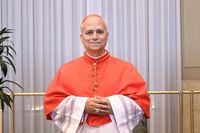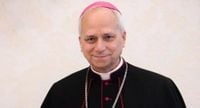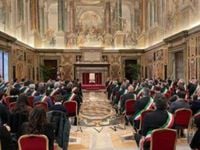On Thursday, May 8, 2025, the white smoke from the Sistine Chapel signaled the election of a new leader for the Catholic Church. Cardinal Robert Francis Prevost, an American, was proclaimed Pope Leo XIV, marking a historic moment as he becomes the first North American Pontiff in the Church's long history.
The election, completed on the second day of the conclave, reflects a desire for continuity following the transformative papacy of Pope Francis, who passed away just 17 days prior on April 22, 2025, due to complications from a stroke and pneumonia. The conclave began on May 7, 2025, and involved 133 voting cardinals, a number greater than the 117 who participated in the 2013 conclave.
As the crowd in Piazza San Pietro swelled to approximately 45,000, anticipation filled the air. The atmosphere was electric as people from various nations gathered, many waving flags and capturing the moment with their smartphones. When the white smoke finally appeared at 17:43 local time, it was met with a thunderous applause, signaling the end of the waiting period.
Cardinal Dominique Mamberti, charged with the announcement, proclaimed in Latin, "Habemus Papam," introducing the new Pope to the world. Dressed in traditional white vestments, Pope Leo XIV addressed the crowd, emphasizing peace and unity in his first words. "Peace be with you! This is the peace of the Risen Christ, a disarmed and disarming peace, humble and persevering. It comes from God, who loves us all unconditionally," he said.
Prevost, born on September 14, 1955, in Chicago, Illinois, has had a distinguished career in the Church. He entered the Order of Saint Augustine in 1977 and was ordained a priest in 1982. His academic credentials include a doctorate in canon law from the Pontifical University of St. Thomas Aquinas in Rome, obtained in 1987. Before his election, he served as the prefect of the Dicastery for Bishops and was created cardinal by Pope Francis in 2023.
In his inaugural address, Pope Leo XIV paid tribute to his predecessor, recalling the "weak but always courageous voice of Pope Francis that blessed Rome." He reiterated Francis's message of hope, stating, "God loves you all, and evil will not prevail! We are all in God's hands. Therefore, without fear, united, hand in hand with God and among ourselves, let us move forward."
The conclave itself was characterized by efficiency, lasting just two days with five rounds of voting. The first scrutiny on May 7 resulted in black smoke, indicating no candidate had achieved the necessary two-thirds majority. A second round of voting on May 8 also produced black smoke before the final vote confirmed Prevost's election.
Notably, the election of Pope Leo XIV comes at a time when the Catholic Church faces significant challenges globally. With over 1.3 billion adherents, the Church is experiencing a decline in membership in traditionally strong regions like Europe and North America, while witnessing growth in Africa and Asia.
In his role as bishop of Ayacucho, Peru, Prevost focused on social programs and education, particularly in impoverished communities. His experience in multicultural contexts has equipped him to address the diverse needs of the global Catholic population. He is fluent in English, Spanish, and Italian, enabling him to communicate effectively with a wide range of followers.
The election of a U.S. Pope has generated immediate reactions from leaders worldwide. The President of the United States highlighted the importance of an American Pope for global diplomacy, while Brazilian bishops praised Prevost's familiarity with Latin America, where he has served extensively.
In the days leading up to the conclave, preparations in Vatican City included setting up the traditional stove for burning ballots to produce the smoke signals. The Domus Sanctae Marthae, where the cardinals stayed, was isolated to ensure privacy during the voting process. Security measures were heightened, with over 2,000 agents ensuring the safety of the event.
Pope Leo XIV's name is a clear nod to Leo XIII, who published the encyclical Rerum Novarum in 1891, which laid the groundwork for modern Church social doctrine. Matteo Bruni, director of the Holy See Press Office, emphasized the significance of this connection, stating it reflects a commitment to addressing contemporary issues, including those related to artificial intelligence.
Looking ahead, Pope Leo XIV will celebrate a Mass with the cardinals in the Sistine Chapel on May 9, 2025, followed by the Regina Coeli prayer from the central Loggia of the Basilica of San Pietro on May 11. On May 12, he will meet with accredited media operators who have covered the recent events.
As Pope Leo XIV embarks on his papacy, he will be faced with the task of navigating the complexities of a Church marked by internal divisions. His ability to mediate between progressive and conservative factions will be crucial in shaping the future direction of the Catholic Church.
With a commitment to fostering dialogue and unity, Pope Leo XIV aims to build bridges in a divided world, drawing from his extensive experience and the legacy of his predecessor. The future of the Catholic Church under his leadership promises to be both challenging and transformative.



